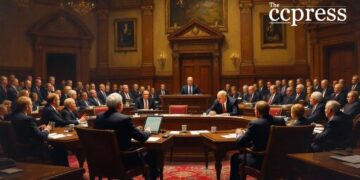- Netanyahu aims to cut U.S.-Israel trade deficit quickly.
- Prompted by U.S. tariffs on Israeli goods.
- Potential impacts on global markets and industries.

Israeli Prime Minister Benjamin Netanyahu announced on April 7, 2025, during his visit to the White House, intentions to swiftly eliminate Israel’s trade deficit with the United States.
Netanyahu’s announcement signals a critical move towards rectifying economic imbalances and mitigating effects of recent U.S. tariffs on Israeli goods.
Benjamin Netanyahu intends to eliminate the trade deficit between Israel and the United States, focusing on removing tariffs and promoting free trade. The recent tariff policy imposed by President Donald Trump heightens the urgency of this commitment.
Netanyahu’s push for tariff elimination comes as part of measures to counter the U.S.’s 17% tariff on Israeli exports. This policy has the potential to strain bilateral trade dynamics, exacerbating existing trade tensions between the two nations.
Markets displayed volatility following Netanyahu’s announcement. Major indices fluctuated, reflecting uncertainty due to current geopolitical tensions and unexpected tariff impositions affecting trade relations.
The event highlights broader implications, including impacts on sectors like technology and pharmaceuticals, which play significant roles in U.S.-Israel trade. Netanyahu’s strategy is viewed as a pivotal move in realigning economic relations.
“We will eliminate the trade deficit with the United States very quickly… We are going to eliminate the tariffs, and rapidly.”
— Benjamin Netanyahu, Prime Minister of Israel
Previously, tariff conflicts under Trump’s administration have led to similar market unrest and strategic trade adjustments. These historical events suggest potential outcomes if Netanyahu’s strategy succeeds in easing tariff burdens.
Insights into financial, regulatory, or technological outcomes include potential alleviation of market tensions and improved trade relations. Previous tariff disputes indicate possible adjustments to policies that could foster economic cooperation and stability.


























